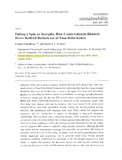Location
Our Vision is to be a world-class university committed to scholarly excellence.
Our Mission is to provide quality university education and training and to embody the aspirations of the Kenyan people and the global community through creation, preservation, integration, transmission and utilization of knowledge.
Core Values
In order to realize the above vision and mission, certain shared values shall be nurtured. There is great need for the University to be guided by the right values derived from the virtues and moral standards of the Kenyan and wider society.
Core Functions
Teaching and Learning: The university offers innovative , relevant and market driven academic programmes , both at undergraduate and postgraduate levels with inbuilt quality control systems the university also provides an environment and policy framework for undertaking high quality and relevant research
Members:
Resources
Displaying 76 - 80 of 298Putting a Spin on Jatropha:
When the Canadian company Bedford Biofuels (BB) started talks with local ranch owners in Tana Delta district (Kenya) about subleasing their land for a large jatropha plantation, they were not the first ones to come to the region for a large-scale agricultural project. Nor were they the first to explore the possibilities of starting a jatropha plantation in Kenya’s coastal area.
Land use, land cover change in urban pastoral interface. A case of Kajiado County, Kenya
Suitable location and influx of immigrants have made pastoral peri-urban Kajiado County a centre of two conflicting interests; urban sprawl and agricultural intensification. To understand the resulting trends over the period 1984-2010 satellite image based analysis of land use cover changes and interviews with landowners were conducted. Interviews focused on the changes and trends in land use, their causes and future forecasts. Percentage changes in land use and land cover types for the years 1984 to 2004, 2004 to 2010 and 1984 to 2010 were determined.
Effects of soil erosion on sediment dynamics, food security and rural poverty in Makueni District
Makueni District has experienced low crop production per unit area despite increased hectarage under crop
production. The district relies heavily on farming for food and income generating activities for the households.
However, poverty level has been on the increase due to poor crop production and limited diversity in sources of
income. Analysis of field survey carried in the district shows high variability of soil nutrients (Nitrogen,
Phosphorous, and potassium), Cation Exchange Capacity (CEC) and soil pH due to various land use systems
The epizootiology of foot - and - mouth disease in high risk zones in Kenya
Foot
-
and
-
mouth disease remains a serious endemic disease in Kenya causing extensive production
losses in
the dairy industry.
I
n
order to
understand
the
foot
-
and
-
mouth disease (FMD)
situation
in Kenya and related
risk factors
in
high risk zones that include;
the
trade and stock routes,
national parks and game reserves, proposed disease free zones and borderlan
ds;
a
cross sectional
sero
-
survey
Land Use Conflicts and opportunities in a Livestock Market: Case study of Garissa Market
Livestock is a crucial source of financial capital for the rural poor. The arid and semi arid lands
are home to nearly 70% of the national herd with an estimated value of Kenya shillings 70
billion. For many, it is the only form of savings available. Therefore, its efficient production and
marketing is essential for sustaining pastoral livelihoods. The existing Garissa livestock market
in Central Division of Garissa District covers a total area of approximately 10 acres. It provides a






